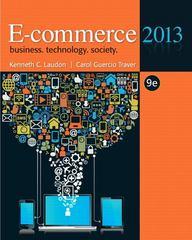Question
1. (a) (i) Explain, with the aid of an example, the 'Law of Demand'. (ii) State and explain three exceptions to the 'Law of Demand'.
1. (a) (i) Explain, with the aid of an example, the 'Law of Demand'.
(ii) State and explain three exceptions to the 'Law of Demand'.
(b) The data below represents the market demand and supply schedules for MP3 Players.
(i) Using the above data, draw the diagram showing the market demand and supply curves for MP3 Players.
(ii) Show on your diagram the price and quantity of MP3 Players at which this market is in equilibrium.
(iii) Using this data, calculate the price elasticity of demand when price changes from 40 to 50. (Show all your workings). For this price change, is demand for MP3 Players elastic or inelastic?
Explain your answer.
( (c) (i) With reference to your diagram in
1(b) (i), assume that consumer demand for MP3 Players increases by 40 units at each price listed above, while supply remains unchanged, draw the new demand curve for this situation and show the new equilibrium price and quantity. (ii) Explain two possible reasons for the shift in the demand curve
2. (a) Explain, with the aid of a diagram, the long run equilibrium position for a monopoly firm which seeks to maximise profits. (25 marks) (b) (i) Define price discrimination.
(ii) Explain three types of price discrimination, using suitable examples in each case.
(c) (i) State and explain three barriers to entry facing entrants to a monopoly market.
(ii) Deregulation of markets (i.e. allowing more suppliers of a good or service into the market) is a continuing development in the Irish economy e.g. energy, mobile phones, transport etc
. Explain how deregulation could affect: (i) Consumers of the good/service;
(ii) Employees in the industry;
(iii) Profits of existing firms. (30 marks) Price Quantity Demanded (units) Quantity Supplied (units) 20 100 20 30 80 40 40 60 60 50 40 80 60 20 100
3. (a) (i) Define the factor of production 'Enterprise'.
(ii) Outline two characteristics which make 'Enterprise' a unique factor of production.
(b) A computer software engineer, who earns 40,000 annually in her current employment, decides to become an entrepreneur and set up her own business in which she expects to earn 75,000 annually.
(i) What is this entrepreneur's 'supply price'? Explain your answer.
(ii) If the business performs as expected, will the entrepreneur earn an 'economic rent'? Explain your answer.
(c) Public services are labour intensive and as a consequence the public sector wage bill accounts for a significant proportion of government current spending.
(i) Explain why Marginal Revenue Productivity (MRP) might not be a suitable method for setting wages in the Public Sector.
(ii) Outline an alternative method for determining wage levels in the Public Sector.
(iii) Identify possible ways in which the Minister for Finance could reduce the Public Sector wage bill.
Step by Step Solution
There are 3 Steps involved in it
Step: 1

Get Instant Access to Expert-Tailored Solutions
See step-by-step solutions with expert insights and AI powered tools for academic success
Step: 2

Step: 3

Ace Your Homework with AI
Get the answers you need in no time with our AI-driven, step-by-step assistance
Get Started


